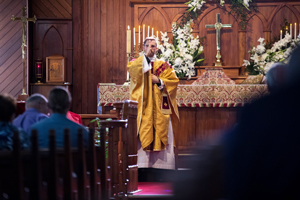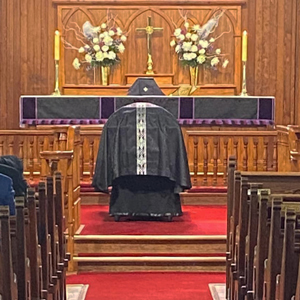“Life in the Church means the sacramental life.”
– Fr Thornton, Spiritual Direction
The Episcopal Church maintains the full sacramental system of the undivided Catholic Church. The sacraments are outward and visible signs of inward and spiritual grace, given by Christ as sure and certain means by which we receive that grace. (BCP 857) The following sacraments are offered for the sake of all people:
Holy Baptism
The Sacrament of Holy Baptism is the principal sacrament of initiation in the Christian Church. The outward and visible sign is pouring (or sprinkling or immersion) of water over the unbaptized person in the name of the Father, and of the Son, and of the Holy Spirit. The inward and spiritual grace is the giving of the Holy Spirit for the incorporation into the Body of Christ, the forgiveness of sins, adoption into the family of God, and the capacity to receive other sacraments.
Holy Baptism is especially appropriate at the Easter Vigil, on the Day of Pentecost, on All Saints’ Day or the Sunday after All Saints’ Day, and on the Feast of the Baptism of our Lord. (BCP 312)
In the case of infants, sponsors (Godparents) who are practicing, baptized Christians, are expected to be included to assist in raising the child in faith and supporting their instruction. For adults or children who are of an age to speak on their own behalf, baptismal preparation classes are arranged beforehand.
If you are interested in discussing receiving the sacrament of Holy Baptism, please contact the church office to arrange an appointment with the Rector.
Confirmation
In the Sacrament of Confirmation, a baptized Christian makes a mature commitment to the faith and receives a strengthening in the gifts of the Holy Spirit. Confirmation may be repeated. The outward and visible sign is the laying on of hands on a baptized person by a Bishop accompanied by a prayer for the strengthening of the Holy Spirit. The inward and spiritual grace is the reception of the sevenfold gifts of the Holy Spirit, and in a sense ordination to the priesthood of all believers, that is to say the laity.
Confirmation establishes a clear relationship between the baptized Christian and their bishop, holding them to the teaching of the Apostles handed down through generations through the succession of bishops.
Confirmation classes are required by adults and children prior to receiving the sacrament, and as it is administered only by the bishop, it generally only occurs once a year or less regularly depending upon the regularity of the bishop’s visitation schedule.
Confirmation completes the process of Christian initiation, is the means by which someone who has been confirmed in another tradition is received into the Episcopal Church, and is generally expected of all persons aged sixteen or older, once the necessary instruction in the faith has been offered.
Please contact the office to inquire about when the next confirmation classes will be offered.
Holy Eucharist
The Eucharist is the principal sacrament of the Church given by Christ. The outward and visible sign is bread and wine over which the words of Christ’s institution have been said. The inward and spiritual grace is the reception of the living and glorified body of Christ for the strengthening of the soul, the forgiveness of sins, and union with Christ for eternal life.
The Sacrament of the Eucharist is available to all baptized Christians, however young children may receive special instruction prior to making their First Communion, during which a celebration is held for those receiving. Please contact the church office to set up an appointment with the rector to discuss First Communion.
At St. Thomas, any Baptized Christian who has examined their conscience and desires to receive the Body and Blood of Christ is welcome to come forward and receive at any mass.
 Confession
Confession
Also known as the Sacrament of Reconciliation or Penance, auricular confession (spoken privately to a priest) has been a part of every Prayer Book in the Anglican tradition. The outward and visible sign is the repentance of sins given by a baptized Christian to a priest in private, to which the priest grants absolution. The inward and spiritual grace are the merits of Christ assuring the penitent of the forgiveness of their sins.
While the Confession and Absolution in the Mass is considered sufficient for one to be able to make their confession, the Prayer Book recognizes that sometimes such a confession is insufficient to remove doubt over whether or not our sins have been forgiven: “ And if, in your preparation [to make your communion], you need help and counsel, then go and open your grief to a discreet and understanding priest, and confess your sins, that you may receive the benefit of absolution, and spiritual counsel and advice; to the removal of scruple and doubt, the assurance of pardon, and the strengthening of your faith.” (BCP 317)
In The Episcopal Church, the Seal of Confession is absolute, and matters confessed to a Priest will never be repeated to anyone.
If you wish to make your confession, please contact the Rector directly to schedule a time. Confessions may be heard in the Church, in the Chapel, or in the Rector’s Office at the penitent’s preference, and the Rector will review the process for making one’s confession for anyone who is unfamiliar with the process.
Anointing
Anointing of the Sick is not just a sacrament for those near death, but is for all those who are sick as St. James tells us (St. James 5:14). The outward and visible sign is the smearing or rubbing of blessed olive oil on a sick person, accompanied by healing prayers. The inward and spiritual grace is the strengthening of the body and soul for healing for eternal life. Whenever someone is anointed, they receive the healing that only the Great Physician, Jesus Christ, knows they need.
Holy Matrimony
Not to be confused with civil marriage, Holy Matrimony is the Sacrament of marriage in the eyes of God. The outward and visible sign is the pledge of self to the other made by one man and one woman for supernatural purposes. The inward and spiritual grace is the indissoluble bond of marriage for procreation of children, hallowing of sexual relations between husband and wife, and mutual love and support.
Marital preparation courses are required prior to receiving this sacrament to ensure that both parties understand the purposes of Holy Matrimony, and the sacrament of Holy Matrimony is generally restricted to members of the parish.
Please contact the parish office to set up an appointment with the Rector if you are interested in receiving the sacrament of Holy Matrimony at St. Thomas.
Ordination
The Sacrament of Holy Orders is conferred by the Bishop on those called to ministry in the life of the Church. The outward and visible sign is the laying on of hands by the bishop with ordination prayers appropriate to the order to which the ordinand is being ordained. The inward and spiritual grace is the power to minister in the order to which the ordinand is ordained.
If you believe you are called to Holy Orders, please contact the parish office to set up an appointment with the Rector to discuss your sense of calling and the process for discerning a call to ordination within the Diocese of Central Florida.
 Last Rites
Last Rites
Last Rites, also called the Last Sacraments, is not in itself an eight sacrament, but rather three of the seven offered to a person who is dying. When someone is near death, they are offered an opportunity to make their final confession to a priest, if they are able. Next, they are offered anointing, which is traditionally called extreme unction. In this traditional title extreme should be rendered as ‘at the end’ and is a strengthening of the soul in preparation for death. Finally, a final communion, called viaticum, is offered. Viaticum means food for the journey, and if the person is able to receive, whether a sip of wine from a spoon or a consecrated host or fraction of it, perhaps sodden with Wine, it will be.
Death is a pastoral emergency, and Last Rites are offered to any Christian. Any non-Christian who is dying may also request the presence of a priest who may pray with or over them. Please call the church office immediately at 352-357-4358.
